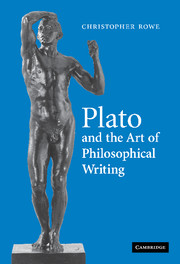Epilogue: What is Platonism?
Published online by Cambridge University Press: 22 September 2009
Summary
One of the main claims that I have attempted to justify in the preceding chapters is that there will usually be a range of aspects, in any given dialogue, that derive simply from the process of embedding content within a persuasive form, without themselves constituting part of that content; what might be called – by analogy with Timaeus’ discourse – the by-products of a literary necessity. Only when we have identified these factors, so I have argued, will we be in a position to separate out what it is that Plato wants to say.
‘What Plato wants to say’: this is the ‘Platonism’ of the title of this short Epilogue – not the Platonism of the various kinds of ‘Platonists’ who followed and interpreted him, each in their own special way. I am not here concerned with them; my interest is solely in the dialogues themselves, starting from them, and not from others' interpretations. (The case of Aristotle's treatment of Plato is in any case a salutary warning of the dangers of that. Despite some recent claims to the contrary, merely being close in time to Plato gives an interpreter few advantages.) If the dialogues sometimes point beyond themselves, as they do, for example, on the subject of the good, in the present context – and probably in others – I am content to note the fact and move on, back to the solider, because more accessible, ground of the written texts.
- Type
- Chapter
- Information
- Plato and the Art of Philosophical Writing , pp. 273 - 276Publisher: Cambridge University PressPrint publication year: 2007



